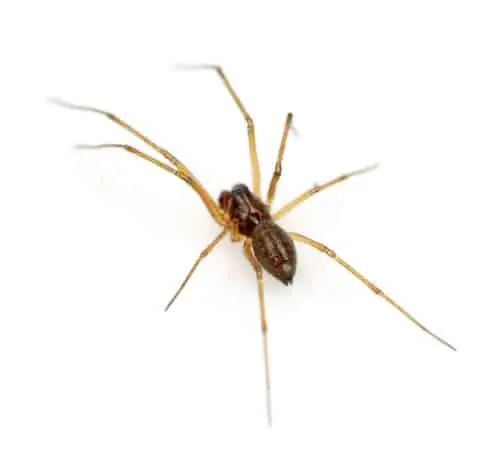Spiders in this family are commonly known as sheet weavers (from the shape of their webs), or money spiders (in the United Kingdom, Ireland, Australia, New Zealand, and in Portugal, from the superstition that if such a spider is seen running on you, it has come to spin you new clothes, meaning financial good fortune). Of the 620 species of spider in Britain, about 250 of them are classified as Linyphiidae, the majority of them being known as “Money Spiders”.
For the most part they are about 2 mm in length but there are one or two which are half this size. Most have uniformly black bodies and brownish legs. Popular superstitions associate these spiders with wealth, hence people are not as prone to killing them. Adult money spiders are widespread throughout Britain in the late summer and early autumn. A common species of money spider spin hammock -like webs, (see below), which are often seen close to ground level on garden plants, long grass, gorse or other vegetation.

Money spiders are also responsible for the gossamer clouds which fall on fields or even ships at sea, on fine days in autumn and early winter. The spiders spin their webs on warm mornings following a cool night and are carried aloft by the rising air currents. Cooler air brings them back to earth, sometimes over 100 miles from where they set off.
HOW MONEY SPIDERS GOT THEIR NAME
Long long ago in a village called Iwe in Nigeria, there lived a boy called Eze. He lived with his widowed mother Uchechi and his sister Ada. Since his father died, poverty had overwhelmed their family-as a result, they can hardly afford a meal a week causing them to suffer from malnutrition.
This went on for a few years with God still upholding them. However, on a lovely Friday morning; Eze got up from bed with an unusual courage and thought their life over. If his father was able to provide enough for their family during his lifetime, why shouldn’t he???
Suddenly, Eze spotted a spider which looked amazingly beautiful. Nevertheless, as it began to crawl away surreptitiously, Eze’s instinct ordered him to follow it. Within a few moments, it stopped to a halt in the middle of an open field which was once his dad’s. Eze picked up the shovel beside him and started digging in order to start planting crops.
Shockingly, the shovel hit something rock-hard. Immediately, he went on his knees and lifted the heavy sack out. He summoned the courage to open it and in it lay several gold coins. Flabbergasted and excited, he broke the news to his family. Due to the fact that the spider which led him there was not more than 5 mm long, spiders this size or smaller are known as money spiders.
In this post, you can read more spider stories and superstitions.
